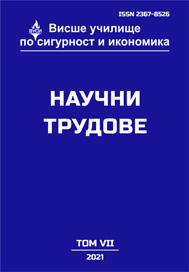Демократичният дефицит в историята на политическите борби в Република Северна Македония
The democratic deficit in the history of political struggle in the Republic of Northern Macedonia
Author(s): Krasimira Moncheva, Teodor Danailov DechevSubject(s): Politics / Political Sciences, Politics, History, Political history, Government/Political systems
Published by: Висше училище по сигурност и икономика (ВУСИ)
Keywords: Republic of Northern Macedonia; democratic tradition; Hürriyet; Bulgarian Exarchate; Union of Bulgarian Constitutional Clubs; People’s Federal Party; political discourse
Summary/Abstract: The study examines in historical retrospect the problem of the lack of democratic experience on the territory of today's Republic of Northern Macedonia. The review and its analysis give us several basic conclusions. The history of political struggles is quite poor of democratic episodes. The individual acts related to the Bulgarian church struggles with the Constantinople Patriarchy, the two or three years of the famous „Hürriyet“, proclaimed by the Young Turks, the miserable picture of the „free“ elections in Versailles Yugoslavia – this is more than a modest asset in the political biography of today's Republic of Northern Macedonia. From the point of view of the doctrinal considerations of the political elite ruling in Skopje today, the democratic episodes traced in this review, can not be a subject of reference, because their Bulgarian background is extremely strong and clearly stated. The plebiscites after the sultan's decree for the establishment of an autonomous Bulgarian Church, led to the expansion of the diocese of the Bulgarian Exarchate. The so-called „orphan delegates“ from Macedonia joined the Bulgarian Constituent Assembly in city of Veliko Tarnovo. During the „Hürriyet“ the public witnessed the activities of the Union of Bulgarian Constitutional Clubs and the People’s Federal Party (Bulgarian Section). In the years after World War I, the Democratic Party in Royal Yugoslavia and personally Luka Davidovich and Mita Dimitrievich sought the votes of people with Bulgarian consciousness in Macedonia. All this excludes the possibility of these episodes being the subject of reference or inspiration in the context of today's process of formation of political life in the Republic of Northern Macedonia. In general, the difficult-to-remove Bulgarian „stuffing“ of the scarce episodes of political democracy in Northern Macedonia, completely excludes them from the political discourse there today. In other words, today in the Republic of Northern Macedonia there is a strong lack of democratic tradition.
Journal: Научни трудове - Висше училище по сигурност и икономика
- Issue Year: VII/2021
- Issue No: 1
- Page Range: 235-275
- Page Count: 41
- Language: Bulgarian

